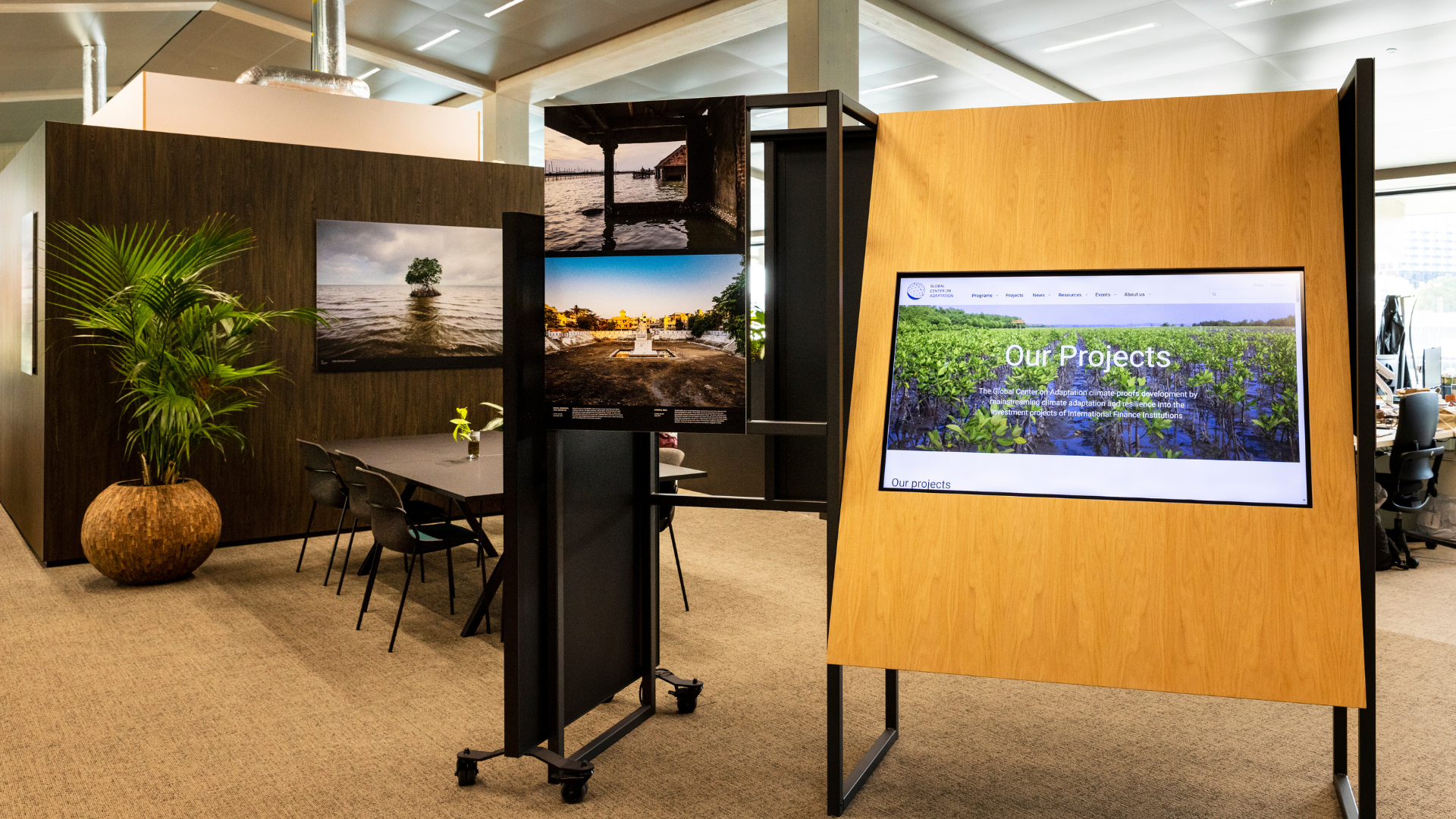The art of balance: Global Center on Adaptation
Meeting Patrick Verkooijen at GCA's floating office in Rotterdam is an experience in itself. In his office in the innovative building, a physical embodiment of climate adaptation, Verkooijen gestures energetically when he talks about his organisation's mission. His animated way of speaking reflects the passion he brings to addressing one of the world's most pressing challenges.
The organisation
The Global Center on Adaptation (GCA) was founded in 2018 to elevate adaptation to climate change higher on the global agenda. GCA operates in the complex international arena of climate change, political interests and economic challenges and emphasises the economic argument for adaptation: investments in climate resilience actually deliver measurable returns.
Since the start as a pioneering organisation with just one employee, founding CEO Patrick Verkooijen, and one board member, former UN Secretary-General Ban Ki-moon, GCA has grown into a leading international organisation. They aim to accelerate action on climate adaptation at both international and local levels and with their team of passionate professionals from around the world, fulfil an important role as experts in adaptation for major infrastructure projects. With offices across the globe, GCA works with organisations like the World Bank and African leaders to accelerate climate adaptation, particularly in Africa.
The challenge
After several years of growth and development, GCA faced some strategic challenges that they wanted to get an outsider perspective and advice on. Not because things were not moving forward, but because they wanted to know how they could improve their ways. Firstly, the organisation needed to balance flexibility in responding to changing global agendas whilst maintaining strategic focus. Internal processes for project investments were still developing and required further professionalisation. As a growing organisation, GCA had to determine which structure would best fit their objectives and services. And as GCA brings together experts from around the world, the organisation needed to integrate a diverse organisational culture effectively.
What GCA needed was an independent, organisation-wide review that would provide both strategic and operational recommendations to enter the next phase of development. As a non-typical organisation operating in a continuously changing context, they were looking for a partner that was flexible enough to assess the specific needs. And could advise on a strategic, operational and programmatic level. "It's very important to get an evaluation and independent assessment that can adapt to what we're doing," Patrick explains, leaning forward in his chair. “And I don’t just want to hear what we are good at. I want to know what we can do better, and preferably also how.”
Baker Tilly's approach: expertise when it matters most
For this assignment, GCA deliberately chose Baker Tilly Advisory over larger consultancy firms with whom they had previously worked. "We have deliberately chosen Baker Tilly. We needed an independent consultancy that would tell it as it is, and not tell me what they think I want to hear," Patrick notes, his hands dynamically emphasising each point.
The Baker Tilly consultants employed a comprehensive approach that worked across different levels of the organisation, conducting in-depth conversations with employees from all layers with attention to cultural diversity. This way they could understand nuances, examine both strategic and operational issues, and formulate their recommendations as concrete as possible so that GCA could implement them immediately.
This approach perfectly reflects Baker Tilly's commitment to truly understand clients' goals and challenges. "What I found particularly impressive was their active listening and ability to find nuance. That cultural sensitivity in dealing with our diverse, international team whilst still extracting the key insights was extraordinarily successful," Patrick agrees.
What distinguishes Baker Tilly from other consulting firms is their explicit approach. They clearly articulate ‘This is good because 1, 2, 3 and 4. And this aspect needs further attention because 1, 2, 3 and 4.’ This gave us practical tools to move forward. - Patrick Verkooijen, CEO Global Center on Adaptation
The result: today's decisions as a foundation for tomorrow
The review by Baker Tilly delivered concrete improvements for GCA. After receiving the report, GCA regrouped organisational units to function more effectively and improved project investment processes based on the recommendations. "We immediately put it to use. It was a structural change, where we even reorganised units organisationally," Patrick shares.
The advice provided GCA with the stability and direction they needed for the next development phase, while the concrete, explicit nature of the recommendations made it possible for GCA to implement them directly. The review is now seen as an important benchmark in GCA's development, with plans to conduct similar evaluations in the future to measure progress.
The added value of Baker Tilly: customer intimacy and quality
When asked what aspects of working with Baker Tilly he valued most, Patrick is very clear.
Unlike other consultants, the team at Baker Tilly demonstrated their commitment to quality by looking at both strategic and operational aspects. That is unique. Most consultancies tend to be either only strategic or only operational. But as we operate at different levels as a starting organisation, it's very important to get an assessment that can switch between these levels.
The culturally diverse organisation also required a specific approach. “Baker Tilly knew how to handle our diverse, international nature effectively, demonstrating their local involvement and commercial acumen. Managing that cultural diversity well, whilst still extracting the nuances, demonstrates the team’s expertise."
Lastly, GCA appreciated working with experienced consultants rather than junior staff. "With a larger, cumbersome consultancy, you don't get the seniority you need; you often end up with the most junior staff."
Sustainable value creation
As our conversation draws to a close, Patrick offers some important advice to other organisations considering a strategic review: "It's very important to know specifically what you want to know. Furthermore, it's very important to be transparent about the boundaries of the review. And lastly, only do it if you genuinely want good advice; don't do it because you need to check it off your list for the board or a sponsor."
Patrick further emphasises that intrinsic motivation to strengthen the organisation is essential to gain maximum benefit from a review like the one Baker Tilly conducted for GCA. This focus on sustainable value creation reflects GCA's own philosophy: it's about building something that lasts.
Now, for tomorrow.
Other insights
No results found


.jpg)